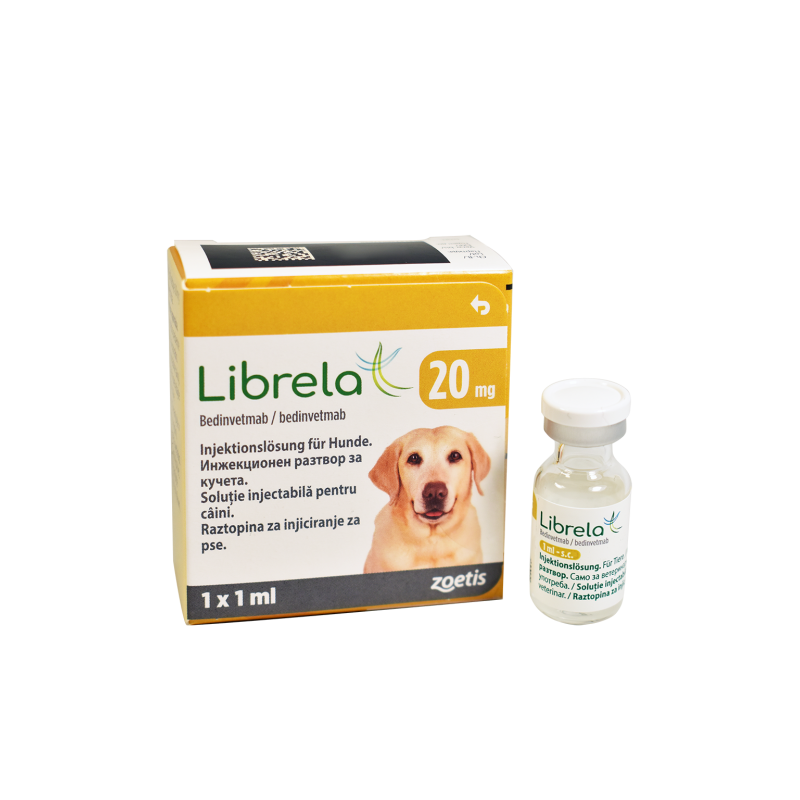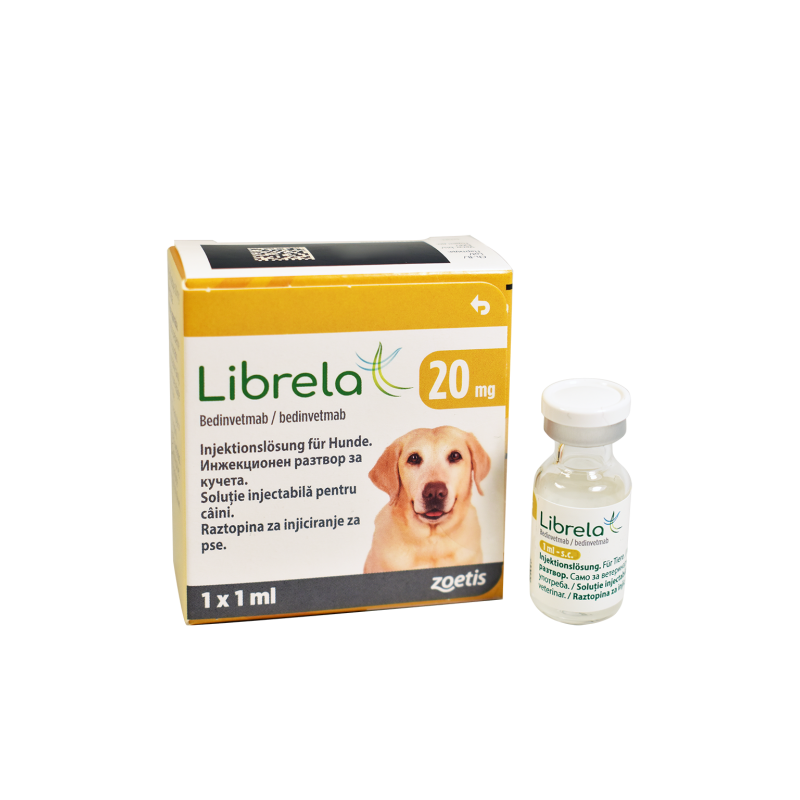torsineen
LIBRELA / 30-40 KG / 20 MG BEDINVETMAB 1 ML 2x
Couldn't load pickup availability
Librela / 30-40 kg / 20 mg Bedinvetmab 1 ml
Presentation
Each vial of 1 ml contains 5, 10, 15, 20 or 30 mg bedinvetmab.
Bedinvetmab is a caninised monoclonal antibody expressed through recombinant techniques in Chinese hamster ovary (CHO) cells.
Uses
Indicated for the alleviation of pain associated with osteoarthritis in dogs.
Dosage and administration
For subcutaneous use.
Dosage and treatment schedule
The recommended dose is 0.5-1.0 mg/kg bodyweight, once a month.
For dogs weighing <5.0 kg aseptically withdraw 0.1 ml/kg from a single 5 mg/ml vial and administer subcutaneously.
For dogs between 5 and 60 kg administer the entire content of the vial (1 ml) according to the table below:
|
LIBRELA strength (mg) to be administered |
|||||
|
Bodyweight (kg) of dog |
5 |
10 |
15 |
20 |
30 |
|
5.0 - 10.0 |
1 vial |
||||
|
10.1 - 20.0 |
1 vial |
||||
|
20.1 - 30.0 |
1 vial |
||||
|
30.1 - 40.0 |
1 vial |
||||
|
40.1 - 60.0 |
1 vial |
||||
|
60.1 - 80.0 |
2 vials |
||||
|
80.1 - 100.0 |
1 vial |
1 vial |
|||
|
100.1 - 120.0 |
2 vials |
||||
For dogs above 60 kg, the contents of more than one vial are required to administer a single dose. In those cases, withdraw the content from each required vial into the same syringe and administer as a single subcutaneous injection (2 ml).
Contra-indications, warnings, etc
Do not use in cases of hypersensitivity to the active substance or to any of the excipients.
Do not use in dogs under 12 months.
Do not use in animals intended for breeding.
Do not use in pregnant or lactating animals.
The veterinary medicinal product may induce transient or persistent antibodies. The induction of such antibodies is uncommon and may have no effect or may result in a decrease in efficacy in animals that responded to treatment previously.
If no or limited response is observed within one month after initial dosing, an improvement in response may be observed after administration of a second dose one month later. However, if the animal does not show a better response after the second dose, the veterinary surgeon should consider alternative treatments.
The safety of the veterinary medicinal product has not been established during pregnancy and lactation or in breeding dogs. Laboratory studies with anti-NGF antibodies in cynomolgus monkeys have shown evidence of teratogenic and foetotoxic effects.
In a laboratory study over a 2-week period in young, healthy dogs without osteoarthritis, this veterinary medicinal product had no adverse effect when concomitantly administered with a non-ster. anti-inflammatory product (carprofen).
There are no safety data on the concurrent long-term use of NSAIDs and bedinvetmab in dogs. In clinical trials in humans, rapidly progressive osteoarthritis has been reported in patients receiving humanised anti-NGF monoclonal antibody therapy. The incidence of these events increased with high doses and in those human patients that received long-term (more than 90 days) non-ster. anti-inflammatory products (NSAIDs) concomitantly with an anti-NGF monoclonal antibody.
Dogs have no reported equivalent of human rapidly progressive osteoarthritis.
No other laboratory studies on the safety of concomitant administration of this veterinary medicinal product with other veterinary medicinal products have been conducted. No interactions were observed in field studies where this veterinary medicinal product was administered concomitantly with veterinary medicinal products containing parasiticides, antimicrobials, topical antiseptics with or without cort., antihistamines and vaccines.
If a vaccine(s) is to be administered at the same time as treatment with this veterinary medicinal product, the vaccine(s) should be administered at a different site to that of Librela’s administration, to reduce any potential impact on immunogenicity of the vaccine.
Do not mix with any other veterinary medicinal product.
Mild reactions at the injection site (e.g. swelling and heat) may uncommonly be observed.
The frequency of adverse reactions is defined using the following convention:
- very common (more than 1 in 10 animals treated displaying adverse reaction(s))
- common (more than 1 but less than 10 animals in 100 animals treated)
- uncommon (more than 1 but less than 10 animals in 1,000 animals treated)
- rare (more than 1 but less than 10 animals in 10,000 animals treated)
- very rare (less than 1 animal in 10,000 animals treated, including isolated reports).
No adverse reactions, except mild reactions at the injection site, were observed in a laboratory overdose study when Librela was administered for 7 consecutive monthly doses at10 times the maximum recommended dose.
In case of adverse clinical signs after an overdose the dog should be treated symptomatically.
User warnings
Hypersensitivity reactions, including anaphylaxis, could potentially occur in the case of accidental self-injection. Repeated self-administration may increase the risk of hypersensitivity reactions.
The importance of Nerve Growth Factor in ensuring normal foetal nervous system development is well-established and laboratory studies conducted on non-human primates with human anti-NGF antibodies have shown evidence of reproductive and developmental toxicity. Pregnant women, women trying to conceive and breastfeeding women should take extreme care to avoid accidental self-injection.
In case of accidental self-injection, seek medical advice immediately and show the package leaflet or the label to the physician.
Share


